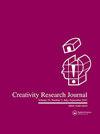Malevolent Creativity as Parochial Altruism? Examining the Intergroup Bases of New and Harmful Ideas
IF 2.5
3区 心理学
Q2 PSYCHOLOGY, EDUCATIONAL
引用次数: 0
Abstract
Emerging theory and evidence suggest that intergroup relations may stimulate malevolent creativity, but the intergroup foundations of malevolent creativity remain unexplored. Drawing from theories of intergroup conflict, we argue that malevolent creativity can be understood through the lens of parochial altruism, one’s willingness to partake in personally risky activity to harm outgroups (i.e. parochialism) in favor of an ingroup (i.e. altruism). Accordingly, malevolent creativity can be viewed as the willful generation and consideration of novel ideas for oneself to enact harm on an outgroup on behalf of an ingroup. Many instances of parochial altruism such as war or terrorism begin from strong sentiments of ingroup love and become more likely when paired with reasons to aggress against an outgroup. Extending this logic to malevolent creativity, we contend that ingroup affinity predicts malevolent creativity and that this relation grows stronger when people hold hostile attitudes toward the outgroup––or, in the absence of hostility, are directly provoked by outgroup members. We test our propositions in a sample of 307 undergraduate students and find partial support for our predictions.恶意的创造力是狭隘的利他主义?检视有害新观念的族群间基础
新出现的理论和证据表明,群体间关系可能会刺激恶意创造力,但恶意创造力的群体间基础仍未被探索。根据群体间冲突的理论,我们认为恶意的创造力可以通过狭隘的利他主义来理解,一个人愿意参与个人冒险的活动来伤害外群体(即狭隘主义),以支持内群体(即利他主义)。因此,恶意创造力可以被看作是故意产生和考虑自己的新想法,以代表内部群体对外部群体造成伤害。许多狭隘利他主义的例子,如战争或恐怖主义,都源于强烈的群体内爱,当与攻击外部群体的理由结合在一起时,这种利他主义就更有可能出现。将这一逻辑扩展到恶意创造力,我们认为,群体内亲和力预示着恶意创造力,当人们对外群体持敌对态度时,这种关系会变得更加强烈——或者,在没有敌意的情况下,由外群体成员直接挑起。我们在307名本科生的样本中测试了我们的命题,并发现了我们预测的部分支持。
本文章由计算机程序翻译,如有差异,请以英文原文为准。
求助全文
约1分钟内获得全文
求助全文
来源期刊

Creativity Research Journal
Multiple-
CiteScore
5.10
自引率
7.70%
发文量
52
期刊介绍:
Creativity Research Journal publishes high-quality, scholarly research capturing the full range of approaches to the study of creativity--behavioral, clinical, cognitive, crosscultural, developmental, educational, genetic, organizational, psychoanalytic, psychometrics, and social. Interdisciplinary research is also published, as is research within specific domains (e.g., art, science) and research on critical issues (e.g., aesthetics, genius, imagery, imagination, incubation, insight, intuition, metaphor, play, problem finding and solving). Integrative literature reviews and theoretical pieces that appreciate empirical work are extremely welcome, but purely speculative articles are not published. Readers are encouraged to send commentaries, comments, and evaluative book reviews.
 求助内容:
求助内容: 应助结果提醒方式:
应助结果提醒方式:


